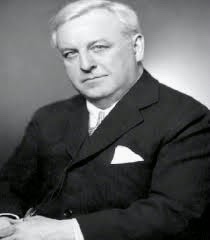 Today I honor Ralph Walker on the 125th anniversary of his birth.
Today I honor Ralph Walker on the 125th anniversary of his birth.
Born on November 28, 1889, Ralph lived until January 17, 1973.
My friends and colleagues have heard me speak about Ralph recently, since I participated in the Ralph Walker documentary back in October (still online here). And a few weeks ago – on October 15 – I shared a few thoughts about my friendship with Ralph, memories from back when I was a very young man (and he was a very old man). These were published in a previous post, also called Knowing Ralph Walker.
It was a lovely experience, knowing this remarkable man, and the fact that he was an eminent and highly respected architect and one of the New Yorkers who helped define the shape of our city continues to impress me. I feel very privileged to have known him, even though he has now been gone for many years.
Much of Ralph’s professional success was detailed in the documentary and, particularly, in Ralph Walker: Architect of the Century, by architecture scholar Kathryn E. Holiday and published by Rizzoli in connection with the 2012 exhibition of the same name. As it happens, I am in possession of several of the more “professional” (we might say) artifacts from Ralph’s career, as he kindly gave me a collection of a number of things he wrote, including his self-published book The Fly in the Amber: Comments on the Making of Architecture. And of special interest to me was his fascination, from early childhood (thanks to his mother’s influence) in the theater and the larger concept of the place of theater and theatrical performance and theater architecture in society. Perhaps I will write about these.
Today, though, I want to write a little about the more personal side of Ralph Walker, for (as might be guessed from his love of anything having to do with the performing arts), he was a great patron of the arts. What we used to refer to as the “liberal arts” played a big part in his personal life. He did indeed love the “softer,” non-engineering side of life, and in his later years he gave full expression to this interest by composing “little” (he called them) poems about some of what he thought about.
One of these has special interest for me now (see The New York Summer Winds Down with a Special Happy Memory, about the Caramoor Summer Music Festival). Written in 1970, Ralph called it “Musique de Table by Georg Phillip Telemann 1681-1767: A Study in Baroque.” He gave me a signed copy because, I suppose, of our many conversations about music and the place of music in our lives and I’m pleased to reproduce it here.
Ralph introduced the poems:
“At Caramoor in Westchester County the work was given under the direction of Julius Rudel. I felt the concert was muted and slow in tempo. I realized it was meant to be performed indoors and therefore some of the vibrancy was lost. The following is no attempt to adjust thought to the music. The music is light and gay with frivolity.”
The poem is in eight sections, each with its title. The titles correspond, I gather, with the sections of the piece as played at Caramoor but as I’m not very familiar with the structure of the famous Musique de Table I can’t confirm that. Perhaps Ralph made them up, or adapted them from the evening’s program (the Britannica tells us that the piece, published in 1733, contained “three orchestral suites, three concerti, three quartets, three trios, and three sonatas.” So I’m not sure how Ralph came up with eight titles for his poems).
As Ralph chose to print his poetry compositions in all caps, I follow his style.
Musique de Table by Georg Phillip Telemann 1681-1767: A Study in Baroque.
OUVERTURE
HOW INVITING IS THE MOOD
SHOULD I WONDER
THAT I CAME
THESE LARGE AFFAIRS
ARE SUCH A BORE
YOU SIGH AND SAY
OH LORD HOW LONG
THE STRANGE PAUSE
SOMEONE TO SAY
GRACE
A BISHOP PERHAPS
OR A RABBI
MAY HE WELL BE BRIEF
“MAY THE BLESS’ED BLESS US”
HOW QUAINT HOW OFFBEAT
WHO ARE THE BLESS’ED
WHO ARE THE BLESSED
ONE OF THOSE OVERTURES THAT
WITHOUT REASON REQUIRE
STILL ANOTHER AMEN
ATTUNED WITH DESTINY
A MUMMY HAS BEEN PASSED
BERGERIE
AS I LEFT
AND THE DUSK CAME DOWN
A LONELY SHEPHERD LED HIS FLOCK
TOWARD THE ENCLOSING FOLD
WHERE MOVING FAST THEY SOUGHT
THEIR EVENING’S REST
THE LAMBS IMPATIENCE NUDGING
SOUGHT THE TEATS OF DAMS
THE SKY WAS BRILLIANT
AND THE RAYS
OF THE DYING SUN
LEAPT TO AMBIENT BLUE
THE SHEPHERD ON HIS LITTLE FLUTE
SIGHED A THRENODY
FOR THE PASSING DAY
TO END IN THRILLING NOTES
ALMOST IN ELEGY
FOR THE EVENING’S QUIET
AS WE MOVED TOWARD
THE SCRUMPTIOUS TABLE
HOW LIKE SHEEP WE SEEM
EAGERLY SEEKING
OUR NAMES AND PLACES AND THOSE
WHO BUT BEFORE WERE STRANGERS
NOW WE PLAY OUR PARTS
SEEK THE SAVOR
OF THE MEATS
PERHAPS OUR MINDS
Leave a Reply